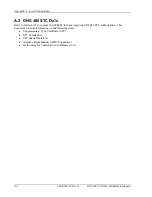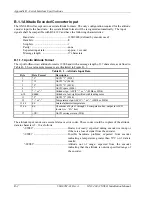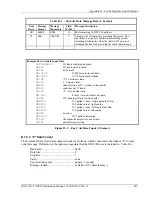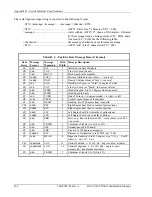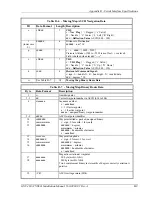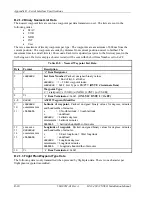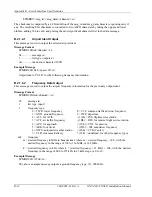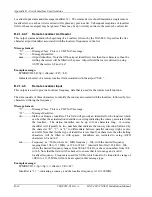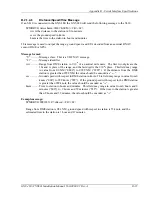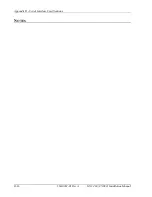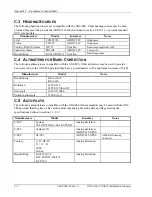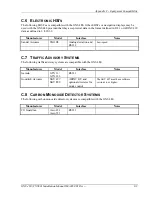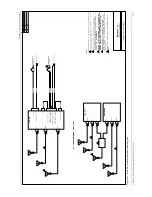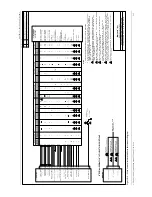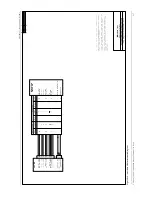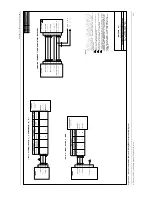
Appendix B - Serial Interface Specifications
B-14
560-0982-01 Rev A
GNS 480 (CNX80) Installation Manual
Localizer Input commands (message identifier 23). The remote device should maintain a single remote
localizer list, so each new list received will replace any previous list. Subsequent receptions of localizer
lists for the same airport may be ignored. There may be up to twenty entries in the remote Localizer list.
B.2.1.4.4.1
Remote Localizer List Header
This output command marks the beginning of a Localizer list sent by the GNS 480. It specifies the five
character airport identifier associated with the localizer frequencies in the list.
Message format:
“V”............ Message Class. This is a VHF NAV message.
“22”........... Message Identifier.
aaaa ........... Airport identifier. Note that if the airport identifier is less than four characters, then the
trailing characters will be filled with spaces. Airport Identifiers are restricted to using
ASCII characters 0-9 and A-Z.
Example message:
$PMRRV22SLE<Sp><chksum><CR><LF>
Indicates the start of a remote localizer list associated with the airport “SLE ”.
B.2.1.4.5
Remote Localizer Input
This output is used to provide Localizer frequency data that is used for the remote recall function.
The data consists of three characters to identify the runway associated with the localizer, followed by two
characters defining the frequency.
Message format:
“V”............ Message Class. This is a VHF NAV message.
“23”........... Message Identifier.
iiii.............. Station or Runway identifier. This field will provide an identifier for the localizer which
can be either the actual station identifier or a string indicating the runway associated with
the localizer. The station identifier can be up to four characters long. A runway
identifier will typically be two numbers that indicate the runway direction followed by
the character “R”, “C”, or “L” to differentiate between parallel runways (right, center,
and left). Note that if either type of identifier is less then four characters, then the trailing
characters will be filled in with spaces. Identifiers are restricted to using ASCII
characters 0-9 and A-Z.
mk ............. Frequency: m = MHz, where m = MHz frequency – 30h, with the desired frequency
ranging from 108 to 111 MHz, or 3Ch to 3Fh; k = (desired kHz offset / 25 kHz) + 30h,
where the desired frequency ranges from 000 to 950 kHz, or the even numbers from 30h
to 56h. Note that the field will be checked to ensure that it is in range and a valid
localizer frequency. Frequencies used for VORs, which can also be found in the range of
108.10 to 111.95 MHz, will not be accepted in this message type.
Example message:
$PMRRV2331<Sp><Sp>><<chksm><CR><LF>
Identifier is “31 ”, indicating a runway, and the localizer frequency is 110.300 MHz.
Summary of Contents for GNS 480
Page 1: ...GNS 480 CNX80 Color GPS Nav Com Installation Manual September 2004 560 0982 01 Rev A...
Page 10: ...Table of Contents viii 560 0982 01 Rev A GNS 480 CNX80 Installation Manual NOTES...
Page 30: ...General Information 1 20 560 0982 01 Rev A GNS 480 CNX80 Installation Manual NOTES...
Page 126: ...Periodic Maintenance 6 2 560 0982 01 Rev A GNS 480 CNX80 Installation Manual NOTES...
Page 150: ...Appendix D Interconnect Diagrams D 2 560 0982 01 Rev A GNS 480 CNX80 Installation Manual NOTES...
Page 185: ......
Page 186: ......

